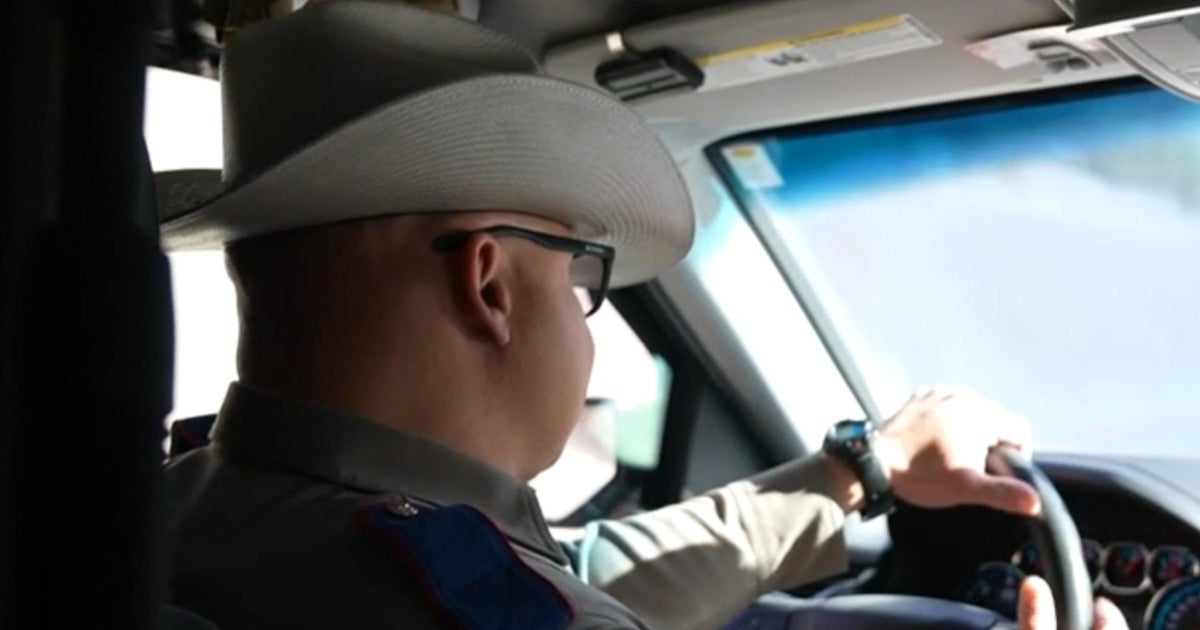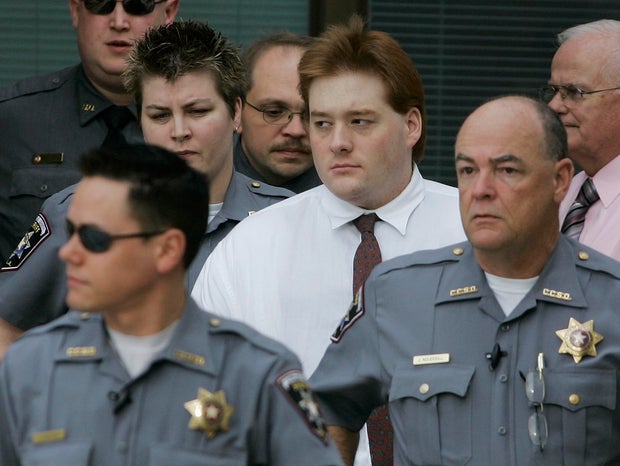CBS News
Trump claims Harris is responsible for a controversial shoplifting law, but he overstates her role

Former President Donald Trump often blames Vice President Kamala Harris for a California law that he claims permits shoplifting up to $950 in merchandise without consequences, seeking to portray her as a member of the “radical left” by lambasting her positions and record on criminal justice.
In at least eight recent campaign and press events, Trump and other high-profile Republicans have sought to cast Harris as weak on crime, holding her responsible for California’s Proposition 47, which makes the theft of goods worth $950 or less a misdemeanor, rather than a felony.
“She came up with a great idea. You can steal as much as you want up to $950, and nothing happens to you,” Trump said earlier this month in remarks to the Fraternal Order of Police in Charlotte, North Carolina.
Trump’s claim is misleading because it overstates Harris’ role in the bill. As California’s attorney general when the proposal took effect, Harris had a role in writing the initiative’s finalized title and summary, and she verified that the proposition met the number of signatures required to be added to the ballot. However, Harris was not involved in drafting the law or passing it, and she remained neutral on the initiative throughout the process, according to The Mercury News and SFGate.
The law
Proposition 47 was a ballot initiative created in response to a 2011 Supreme Court ruling that ordered California to reduce its prison population due to overcrowding. California voters passed the measure in 2014.
Previously under state law, shoplifting goods worth up to $950 was often charged as a misdemeanor. In some cases, the crimes were also charged as burglaries, which could be a felony. Under Proposition 47, shoplifters with prior serious or violent convictions would face county jail rather than state prison sentences, with the aim of saving taxpayer dollars. People convicted of misdemeanor shoplifting can still face consequences of up to six months in jail and fines up to $1,000.
In 2010, when Arnold Schwarzenegger was California’s Republican governor and before Harris’ tenure as state attorney general, California legislators passed Assembly Bill 2372, which set a $950 threshold for grand theft. This raised it from the 1982 threshold of $400 to account for inflation.
Proposition 47’s threshold is lower than the amount set by other states including Republican-led Arkansas, Nebraska and Texas, which charges a felony for $2,500 worth of stolen goods. More than half of all states have higher thresholds than California, according to World Population Review, an independent organization that analyzes data and demographics.
However, unlike California, other states allow prosecutors to charge repeat lower-level offenders with felonies.
Trump has repeatedly attacked Harris’ record as a prosecutor as both candidates attempt to appeal to voters who are concerned about crime.
Recent surveys indicate that the topic is a key issue for voters. CBS News found 63% of registered voters who were polled say crime is a major factor in their vote in the presidential election.
CBS News
Google Maps helps solve murder mystery by capturing moment a person put suspected corpse into car in Spain

Google Maps has guided Spanish investigators to resolve a year-long murder mystery by capturing the moment a person stowed a suspected corpse into a car.
Police in the northern region of Castile and Leon began their probe in November 2023 when someone reported the disappearance of a male relative.
Officers arrested a woman who was the missing male’s partner and another man who was her ex-partner in Soria province on November 12, police said in a statement on Wednesday.
Investigators then raided the suspects’ homes and inspected their vehicles but also stumbled on an unexpected lead in the search for further clues.
These were “images in a location application” where they “detected a vehicle that may have been used during the course of the crime,” the statement said.
Spanish media circulated pictures of a screenshot of Google Maps’ Street View from October 2024 showing a person dumping an object covered in a white shroud into a car trunk in the village of Tajueco. It was the first time in 15 years that the car had been to the town of Tajueco, the BBC reported.
The images contributed to resolving the case, though they were not “decisive,” police said.
Officials said another photo sequence shows the blurred silhouette of someone transporting a large white bundle in a wheelbarrow, the BBC reported.
The central government’s representative in Soria, Miguel Latorre, told public broadcaster RTVE the person “can presumably be” considered the culprit.
Police said a severely decomposed human torso believed to belong to the victim had been found this month in a cemetery in Soria province. El Pais daily reported that he was a 33-year-old Cuban.
A judge has ordered the suspects into custody and the investigation remains open.
This marks at least the second time that Google technology has helped crack a cold case. In 2019, the remains of a man missing for 22 years were finally found thanks to someone who zoomed in on his former Florida neighborhood with Google satellite images and noticed a car submerged in a lake.
CBS News
2 soldiers killed by landmine blast in Mexico day after 2 troops killed by booby trap in same region

A blast killed two Mexican soldiers in the second deadly incident this week involving an improvised landmine in a crime-plagued western state, authorities said Wednesday.
According to the El Universal newspaper, the soldiers were trying to deactivate the device when it exploded.
The blast happened late on Tuesday in Buenavista in Michoacan, the state prosecutor’s office said.
A military source who did not want to be named said that troops were looking for similar devices believed to have been planted in the area.
On Monday, a blast caused by another improvised landmine killed two Mexican soldiers and wounded five others in the same region. Before the explosion, the soldiers had discovered the dismembered bodies of three people, officials said.
The device was suspected to have been planted by members of a local criminal group waging a turf war with a bigger drug cartel, Defense Minister Ricardo Trevilla said Tuesday.
Six other soldiers had been killed by similar improvised devices since late 2018, he said.
Mexico is plagued by widespread drug-related violence that has seen more than 450,000 people killed since the government deployed the army to combat trafficking in 2006, according to official figures.
In the only previous detailed report on cartel bomb attacks in August 2023, the defense department said at that time that a total of 42 soldiers, police and suspects were wounded by IEDs in the first seven and a half months of 2023, up from 16 in all of 2022.
Overall, 556 improvised explosive devices of all types – roadside, drone-carried and car bombs – were found in 2023, the army said in a news release last year.
CBS News
Oklahoma set to execute man who killed girl, 10, during cannibalistic fantasy

Oklahoma is preparing to execute a man who killed a 10-year-old girl in what would be the nation’s 25th and final execution of the year.
Kevin Ray Underwood is scheduled to die by lethal injection on Thursday, his 45th birthday, at the Oklahoma State Penitentiary in McAlester. Underwood, a former grocery store worker, was sentenced to die for killing Jamie Rose Bolin in 2006 as part of a cannibalistic fantasy.
Underwood admitted to luring Jamie into his apartment and beating her over the head with a cutting board before suffocating and sexually assaulting her. He told investigators that he nearly beheaded the girl in his bathtub before abandoning his plans to eat her.
Sue Ogrocki / AP
Oklahoma uses a three-drug lethal injection process that begins with the sedative midazolam followed by a second drug that paralyzes the inmate to halt their breathing and a third that stops their heart.
During a hearing last week before the state’s Pardon and Parole Board, Underwood told the girl’s family he was sorry.
“I would like to apologize to the victim’s family, to my own family and to everyone in that room today that had to hear the horrible details of what I did,” Underwood said to the board via a video feed from the Oklahoma State Penitentiary.
The three board members in attendance at last week’s meeting all voted against recommending clemency.
Underwood’s attorneys had argued that he deserved to be spared from death because of his long history of abuse and serious mental health issues that included autism, obsessive-compulsive disorder, bipolar and panic disorders, post-traumatic stress disorder, schizotypal personality disorder and various deviant sexual paraphilias.
His mother, Connie Underwood, tearfully asked the board to grant her son mercy.
“I can’t imagine the heartache the family of that precious girl is living with every single day,” Connie Underwood said. “I wish we understood his pain before it led to this tragedy.”
But several members of Bolin’s family asked the board to reject Underwood’s clemency bid. The girl’s father, Curtis Bolin, was scheduled to testify to the board but became choked up as he held his head in his hand.
“I’m sorry, I can’t,” he said.
Prosecutors wrote in opposing Underwood’s clemency request that, “Whatever deviance of the mind led Underwood to abduct, beat, suffocate, sexually abuse and nearly decapitate Jamie cannot be laid at the feet of depression, anxiety or (autism).
“Underwood is dangerous because he is smart, organized and driven by deviant sexual desires rooted in the harm and abuse of others.”
In a last-minute request seeking a stay of execution from the U.S. Supreme Court, Underwood’s attorneys argued that he deserves a hearing before the full five-member parole board and that the panel violated state law and Underwood’s rights by rescheduling its hearing at the last minute after two members of the board resigned.








